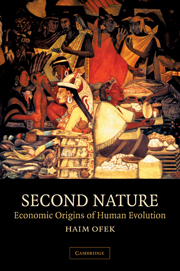Book contents
- Frontmatter
- Contents
- Acknowledgments
- 1 Introduction
- Part 1 Bioeconomics
- 2 Exchange in human and nonhuman societies
- 3 Classical economics and classical Darwinism
- 4 Evolutionary implications of division of labor
- 5 The feeding ecology
- 6 The origins of nepotistic exchange
- 7 Baboon speciation versus human specialization
- Part 2 Paleoeconomics
- References
- Index
3 - Classical economics and classical Darwinism
Published online by Cambridge University Press: 06 July 2010
- Frontmatter
- Contents
- Acknowledgments
- 1 Introduction
- Part 1 Bioeconomics
- 2 Exchange in human and nonhuman societies
- 3 Classical economics and classical Darwinism
- 4 Evolutionary implications of division of labor
- 5 The feeding ecology
- 6 The origins of nepotistic exchange
- 7 Baboon speciation versus human specialization
- Part 2 Paleoeconomics
- References
- Index
Summary
Darwin and the Scottish economists: The first point of junction
The fundamental economic problem of human evolution
In view of the discussion thus far, the issue is no longer the mere existence of a human predisposition to exchange, but its evolutionary origin. Unsure of this origin, Adam Smith himself acknowledged (and deflected) in passing an intriguing question:
Whether this propensity [i.e., to exchange] be one of those original principles in human nature, of which no further account can be given; or whether, as seems more probable, it be the necessary consequence of the faculties of reason and speech, it belongs not to our present subject to enquire. (1976:17, italics added)
The inception of modern economics was thus accompanied (in 1776) by an evolutionary question preceding by nearly a century the Darwinian notion of evolution itself. Adam Smith probably agonized over this question, though as it seems, had the good sense to abort it in due course. Neither he nor his pre-Darwinian readers could fully comprehend the question, let alone conceive a sensible answer to it. With the advantage of hindsight, however, the question seems to present a challenge of the highest order to the modern study of human evolution: Was exchange an early agent of human evolution, or was it merely a late by-product of previously evolved “faculties of reason and speech”?
With the publication of The Descent of Man a century or so later, Darwin had at his disposal a fairly mature notion of evolution applicable to human affairs.
- Type
- Chapter
- Information
- Second NatureEconomic Origins of Human Evolution, pp. 26 - 43Publisher: Cambridge University PressPrint publication year: 2001

